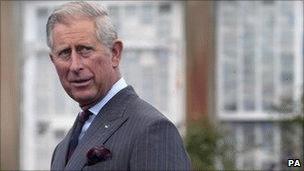The real basis for royal secrecy on environment issues
- Published
- comments

As the arguments continue over whether Prince Charles interferes in political controversies, I thought it would be worth clarifying what seems to be a widespread misapprehension about the legal basis for secrecy on his contacts with ministers.
Over the weekend the Mail on Sunday reported, external that Charles has had at least nine private meetings with ministers in the coalition government.
However we don't know what was said during these conversations, nor whether the prince was exceeding his role in an unconstitutional manner.
Thanks to the latest revelations, external in Alastair Campbell's diaries, we are now aware of Tony Blair's anger at Charles and his interventions over genetically modified crops, for example. But the nature of the prince's dealings with the current government remain secret.
Much attention, external has been focused on the change to the Freedom of Information Act which means that government communications with the heir to the throne are now automatically excluded from FOI.
Previously they could have been released if it was decided that disclosure would be in the overall public interest.
Environmental concerns
This amendment, external was passed under the Labour government last year and implemented, external by the coalition earlier this year. It is not popular with the Campaign for Freedom of Information, external, nor with campaigners against the monarchy, external. Ministers argued that it was necessary to protect the long-standing conventions surrounding the institution.
However, whatever its merits or otherwise, this absolute exemption from FOI is only partly relevant to the current controversy.
That's because, as is well known, many of Prince Charles's biggest concerns (such as GM crops, fox hunting, climate change etc) are to do with the environment - and environmental information has its own system of access which is separate from the Freedom of Information Act.
In other words, if Prince Charles meets the Environment Secretary Caroline Spelman to talk about "tree health" (as he apparently has, twice), information about the content of those meetings is nothing to do with the FOI Act - it would actually fall under the Environmental Information Regulations, external (EIR).
The same applies to his discussions with the fisheries minister about sustainable fishing and with the climate change minister about global warming.
The EIR stem from a European Union directive and do not have any specific provisions protecting members of the Royal Household.
Political memoirs
So on what grounds could communications between the prince and a public authority on environmental matters be kept secret under EIR?
The letters written by Charles himself could be withheld on the basis, external that it would harm his interests, as someone not obliged to supply information to the public authority. And the Information Commissioner has ruled, external that replies to him from the government can be kept secret, because by revealing his views they would thus reveal his personal information in breach of the Data Protection Act (declaration of interest: this was my request, although a similar verdict has been reached in other cases).
However, as the Guardian's reporting, external has shown, these arguments can't be used to prevent disclosure of correspondence from organisations which the prince is closely associated with.
Anyway, the Commissioner's position may be right or wrong, but it is not determined by the amendment which removed the prince's correspondence from the general FOI Act test of deciding on disclosure in line with the balance of the public interest.
So will we find out any more about whether the prince really has been trespassing over the boundaries between constitutional monarchy and elected government?
There is one long-standing case which is being slowly fought through the courts. The Guardian, external has appealed against some decisions from the Commissioner, which blocked its requests for the prince's correspondence with ministers. The case is being considered by the Upper Tribunal.
It involves both environmental and non-environmental information, and will be determined on the law as it was before the recent amendment. The public hearing has been followed by further legal argument in private session, and a decision is still awaited.
If the courts rule against the Guardian, then further public insight into the prince's political role, external will probably depend not on official disclosures but on what former insiders like Alastair Campbell, external choose to pass on.
Update, 1057: The Scottish Information Commissioner's office has drawn my attention to a recent decision from the Scottish Commissioner Kevin Dunion which takes a different line to that of the UK Information Commissioner, Chris Graham.
In March this year Mr Dunion ruled, external that it should be revealed whether or not Prince Charles had made representations to the First Minister on various topics such as red squirrels.
He decided that although this was the prince's personal information, it should be disclosed because the requester (Dominic Kennedy, the investigations editor of The Times) had a legitimate interest in knowing whether the heir to the throne was influencing planning developments or environmental policies.
But note this was only a decision on whether the Scottish government should tell Mr Kennedy if it held any information about princely communications on these matters, and not about whether any such communications, if they existed, should be published. After Mr Dunion's ruling, the Scottish government then announced that in fact no such correspondence existed, external.
So amongst other things we now know that, as at December 2009 (the date of the request), Prince Charles had never corresponded with the Scottish first minister about the plight of the red squirrel.